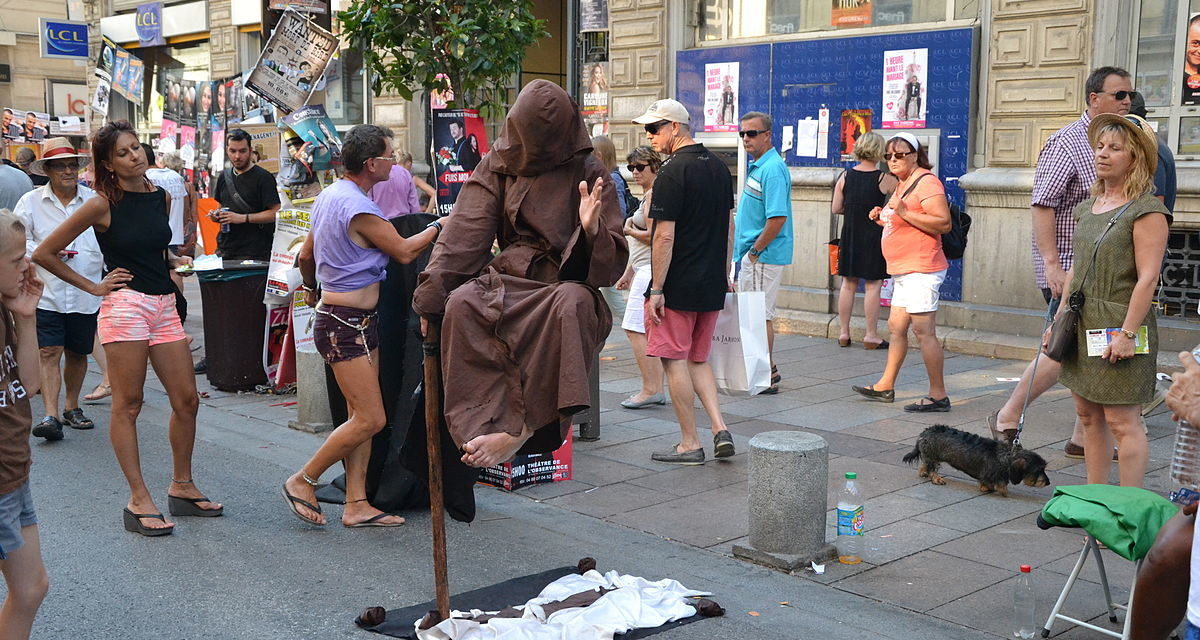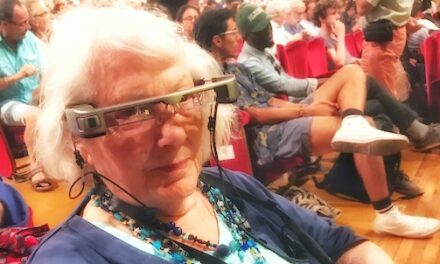Since moving back to Paris this fall, I’ve been making my rounds at the theater, sampling this season’s offerings, and talking with my fellow theater-makers about the latest outrage in the world of theater and cinema arts: the reduction of government-subsidized salaries for actors. This system of compensation is designed for people working in the theater/cinema/television industry who alternate between periods of employment and unemployment, and is called “intermittence du spectacle.” It functions similarly to the way that unions in the United States provide health insurance to their members who have worked a minimum number of hours. However, since health care is socialized in France, this status provides a salary to those who work a minimum number of hours per year.
As an actor, for example, (the number of hours differs according to the profession), once you have worked 507 hours or earned 43 “fees” (which can be comprised of 12 “isolated” hours on contracts that last less than 5 days, or 8 “collective” hours for contracts that last five or more days) in the last 319 days (10.5 months), you are eligible to qualify for the “intermittent du spectacle” status. In comparison, the regular system of compensation for the unemployed outside of the arts requires 122 days or 610 hours of work in the past 28 months for those under 50 years old, or 36 months for those over 50 years old. However, once you have reached your 507 hours, you are paid your government-subsidized salary for eight months, whereas regular unemployment pay is based off a system of one paid day of unemployment per one day of work. Despite this disparity, the median salary of “intermittents du spectacle” is significantly lower than that of a private or semi-public worker’s: 13,700 euros ($17,317) annually for intermittents, compared to 18,400 euros ($23,258).
The system was first created in 1936 for the film industry, as a form of assured compensation for workers who did not qualify for annual or permanent contracts with their employers, because of the short-term nature of their jobs. In 1998, only 100,000 people were registered as “intermittents du spectacle,” but as of 2011, there were 254,394 on record. Intermittents are compensated for their work while they are working, but at a much lower rate than they would be if they were on a long-term contract, because they will receive the rest of their pay during their period of unemployment. In addition, employers of intermittents are required to pay into the system, so that the government is not responsible for paying the entirety of intermittents’ salaries, but only subsidizing them.
This past summer, the government passed legislation that put the intermittent community up in arms and prompted many of them to boycott the prestigious annual Avignon Theater Festival. The accumulation of 507 hours in ten and a half months is comparatively new; prior to 2003, artists had twelve months to accumulate their hours. Although intermittents had demanded a return to the former system, their request was denied. In addition, budget cuts were made to the system, including a cap on the amount that intermittents can earn during their periods of paid unemployment, as well as an increased rate of withholding both from intermittents’ paychecks and from their employers, which will result, on average, in a 0.7-0.8% net loss in salary. This measure will take the largest toll on small theater companies, who will have to pay a significantly larger proportion of their budget to the government to fund the program, as well as intermittents who are on the higher end of the earning spectrum (in the 5,000€ per month range), who will see a much larger proportion of their earnings taxed, and will thereby receive considerably less money during their periods of unemployment.
From my perspective, as a recent liberal arts graduate who has watched her actor friends in New York City working long days and nights in the service industry in order to accommodate their audition schedule, where they would rarely be seen, despite having waited for hours and hours, my immediate reaction to learning about the “intermittent du spectacle” system was one of utter amazement. To think that the government would pay artists and arts technicians a living wage to make a viable career out of their creative work seemed like a dream. And indeed, for up and coming actors like Sébastien Ventura, age 29, who received his intermittent status just over a year ago, the intermittent status makes a huge difference. Whereas he was previously earning from 300 to 600€ per month, with 85% of his work uncompensated, he now benefits from the much more reasonable and reliable salary provided by his intermittent status. The easing of his financial burden allows him to focus on his creative work, rather than having to constantly worry about money and maintain a variety of supplemental survival jobs.
In addition, being able to claim intermittent status gives the French artist a more permanent sense of identity, as it is a widely recognized and respected title. Compared to the life of the struggling artist in the United States, the intermittent system certainly facilitates a more comfortable lifestyle, in line with France’s socialistic government and widespread cultural appreciation of the added value that arts bring to society as a whole. Another actress/singer that I spoke to (who asked to remain nameless) says that although the system can be improved, it allows her to make her living from her craft. As she points out, in the United States, even the most renowned and talented actors are obliged to take on less original projects in Hollywood, for example, in order to have enough money to pursue their own more creative and independent projects. She says, “In France, we can afford to play, to be creative. I can pay for my life with my art. It is impossible to ask an actor to also be a waiter if they are truly working on their craft.”
Another huge difference between the American and French systems of rights and representation for artists is the role that unions play. French unions are much less powerful, financially and legally than American unions, and union membership is by no means as compulsory for French theater-makers as it is for American theater-makers. In fact, some artists have found themselves blacklisted when their employers discover they are union members because their employers are threatened by the trouble their membership could potentially bring. One of the biggest unions in France for intermittents is called the Syndicat Français des Artistes Interprètes. The actress/singer that I spoke to is actively involved with this union, despite the risk of her outspoken position. She told me the union has to follow a very strict set of rules in order to be allowed to negotiate with the government on behalf of its members for their rights. She told me that here in France, people seem to think that social rights “fall from the sky,” but in reality, these rights only exist because people have fought long and hard for them. She says, “In the beginning, [artists] were paid like gypsies, with money in a hat and no rights whatsoever. You cannot fight alone, which is difficult because our professions are very selfish and egotistical, by their very nature.” But when people have a problem, and they need the cheap legal counsel that the union provides, that’s when they’ll join up.
According to this actor, it’s a fight for the public culture right now in France. The intermittents are fighting for just 1% of the national budget when they protest the cuts that were made to the system this past summer. In France, thanks to the political tenet of nationalized culture, it is essential for the government to provide culture to the people, similar to education and a legal system. French people pay taxes for it. With this past summer’s budget cuts to the intermittence system, France appears to be taking a turn towards commercializing culture, but culture is not a product that can be commercialized, because it does not bring direct financial returns. Of course, with a ripple effect, cultural investments bring money to a community, but on a fundamental level, culture is not something that can be budgeted for in a commercialized way.
In addition to the outrage over the decrease in government funding, as soon as you scratch the surface of the intermittent system, the complaints from its participants are quick to come bubbling out. The most frequent complaint amongst people who participate in the industry is that too many people take advantage of the system by cutting corners, over-reporting hours, or taking on an excess of filler work (working as a model at a cosmetics stand in a department store, for example, or playing a character for children’s birthday parties) to boost their reported hours and thereby earn a longer period of unemployment pay.
Intermittents themselves are not the only ones to take advantage of the system: employers frequently abuse it as well, in order to pay a lower wage for the same work. Rather than hiring contracted workers for a project (on a film, for example,) whose salaries would be considerably more expensive, production companies will hire intermittents for the same job, at half the cost. Film and television production companies are not the only culprits, although their budget accounts for a much larger proportion of the industry. Theaters will often wait to pay their actors until they have found funding for their project, and many independent theater projects turn to the abundance of government agencies for funding. However, these grant requests always require a piecemeal assembly of funds with an endless stream of paperwork. This means that actors sometimes devote precious hours to rehearsing a project that folds because the producers are unable to fund it. In addition, even though all rehearsals are technically supposed to be paid, they are frequently not counted as part of the actors’ billable hours for the project, and so they will only be paid for the date of the performance. And of course, there is the recurring story of women who lose their intermittent status when they go out on maternity leave, but I’ll save my thoughts on sexism in the arts in France for a later date.
Another recurrent cry amongst those who are observing the intermittent system (particularly foreign artists working in France), is that the guarantee of making a living out of one’s art changes the motivation and determination of artists to pursue their work. Like any convenience, once the daily struggle to balance subsistence and creative productivity is taken away, it becomes natural to take the ease one’s lifestyle for granted. Even worse, when artists abuse the system and rack up hours on non-artistic projects, they are leeching money out of the pot for other artists who are truly motivated.
One film director from London (who asked to remain anonymous) who has been living in Paris for the past ten years, expresses his frustration on this subject, saying that he believes the quality of art diminishes when artists are better funded, because they’ve lost some of the integrity and the fire in the belly that comes with desperation. Although he believes it’s worthwhile for a country to encourage, support, and value arts and culture, he thinks the pursuit loses its valor when it turns art into another bureaucratic system like anything else. (Or, in the United States, when theater turns into a commercial venture, à la Broadway.) Also, the intermittent system tends to limit the creative horizons of producers and artists, because they are involved in a pandering competition for government funding. That’s not to say that the structure of a handful of extremely rich artists competing with a mass of equally (or more talented) struggling artists is ideal, either. He sums it up with a shrug, saying, “All artists should be amateurs.”
Of course, every system comes with its own challenges. Whereas Americans worry about their theater being corrupted by commercialism, which is starting to worry the French, as well, the role of the government as the predominant national funder of the arts is the barometer of censorship here. Indeed, arts funding in a socialist system tends to suffer from the same standardization effect that plagues all government-run systems (the national curriculum, for example). In striving to ensure equality and preserve a unified vision of French culture and heritage, the constraints pile up quickly. Most people will hire an administrator to fill out the endless paperwork that is required to apply for a government grant for an art project. Moreover, it is impossible to objectively measure the value of art, and so government imposed judgments of which projects deserve funding can have the outcome of inhibiting artists’ creativity because they need to conform to a certain vision of what is culturally valuable in order to receive a grant. Other artists will contradict this idea, saying that they never think about trying to appease the subsidization selection committee when they are coming up with a project, because it is impossible to know what will appeal to them, and art is always about the product, not the money.
All things considered, the intermittent system has its drawbacks, but the valorization of arts as a fundamental component of a healthy society is an irrefutable and appreciable part of the French culture. It becomes a question of what a culture is willing to sacrifice: the well-being of its artists, when they have to work twice as hard to make a living and find time for their creative pursuits, or the well-being of its creative output, when artists are forced to practice their craft within the constraints of a government-funded system. For the time being, the intermittence system is here to stay in France, and it has vocal advocates that will fight to keep it strong and robust, reminding the government that “We are useful and important,” as the woman from the union says. According to Sébastien Ventura, “It’s a point of national pride. When it is used correctly, it allows artists to truly commit to their craft, even in between projects, in order to develop their career.”
This post was written by the author in their personal capacity.The opinions expressed in this article are the author’s own and do not reflect the view of The Theatre Times, their staff or collaborators.
This post was written by Amelia Parenteau.
The views expressed here belong to the author and do not necessarily reflect our views and opinions.


















